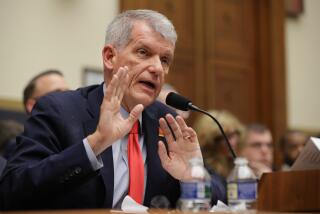What’s wrong with bank culture? A top Fed official points to Wells Fargo scandal
A top Federal Reserve official on Tuesday cited the Wells Fargo & Co., fake accounts scandal as an example of how pay incentives can go wrong and urged banks to align them with proper behavior to improve the industry’s culture.
“There was a serious mismatch between the values Wells Fargo espoused and the incentives that Wells Fargo employed,” William Dudley, president of the Federal Reserve Bank of New York, said in prepared remarks at a London conference.
Dudley has long argued that banking culture needs to improve and on Tuesday highlighted what he said “appeared to be widespread fraud” at Wells Fargo as a prime example of how incentives can trigger bad behavior.
Aggressive sales quotas led employees at the San Francisco bank to open as many as 2 million accounts without customers’ consent in a scandal first uncovered by the Los Angeles Times in 2013.
Wells Fargo agreed to pay $185 million to settle investigations by Los Angeles City Atty. Mike Feuer and federal regulators into the unauthorized accounts. John Stumpf was forced to resign as chief executive and the bank has overhauled its incentive-compensation system.
“Our new compensation plan puts our customers’ interests first and is an important part of rebuilding trust with all of our stakeholders,” Wells Fargo said in a statement Tuesday in response to Dudley’s comments.
The overhaul included eliminating sales goals for retail bankers for opening checking, savings or credit card accounts.
Dudley was critical of Wells Fargo’s previous incentive structure in his speech to the Banking Standards Board, an independent body launched in Britain in 2015 to promote high standards of behavior.
“Neighborhood bankers were paid based on the volume of new accounts opened, apparently with utter disregard for whether customers wanted them or even knew about them,” Dudley said.
“And, like mortgage brokers in the early 2000s, it appears that job security depended almost exclusively on meeting targets, regardless of how those targets were met,” he said.
Dudley said he would “wait before drawing more definitive conclusions” until the completion of ongoing investigations into the Wells Fargo scandal. But he noted it showed “the powerful role — for good or for bad — that incentives can play in an organization.”
Focusing on incentives, which were a major contributing factor to the 2008 financial crisis, is a key to changing banking culture for the better, Dudley said.
“If you want a culture that will support your long-term business strategy, you need to align incentives with the behaviors that will sustain your business over the long haul,” he said.
“A commitment to the long term must be at the core of banking,” Dudley said. “Incentives within a firm should support that goal, not undermine it.”
Trump says businesses can’t borrow because of Dodd-Frank. The numbers tell another story »
Obama saw low-wage workers as struggling moms. Trump may see them as suburban teens »
Follow @JimPuzzanghera on Twitter
ALSO
Wells Fargo customers continue to shy away from the bank amid fallout from its accounts scandal
Wells Fargo shareholders call for a new, broader probe into the bank’s accounts scandal
Rep. Maxine Waters blasts Wells Fargo for meeting with Republicans but stonewalling Democrats
UPDATES:
Noon: This article was updated with comments from Wells Fargo.
This article originally was published at 6 a.m.







